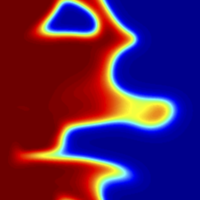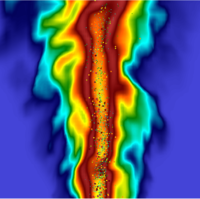UK Turbulent Reacting Flows Consortium (UKCTRF)
UKCTRF performs high-fidelity computational simulations (i.e. Reynolds Averaged Navier-Stokes simulations (RANS), Large Eddy Simulation (LES) and Direct Numerical Simulations (DNS)) to address the challenges related to energy efficiency through the fundamental physical understanding and modelling of turbulent reacting flows. Engineering applications range from the formulation of reliable fire-safety measures to the design of energy-efficient internal combustion engines and gas turbines. The research of the consortium is divided into three broad work packages: (i) Fundamental physical understanding based on cutting-edge DNS of single- and multi-phase reacting flows, (ii) Applied research and technology development and (iii) Algorithm and architecture development for future platforms.
| Website | http://www.ukctrf.com/ |
| Contact | |
| Consortium Head | Prof. N. Chakraborty |
| ARCHER CSE Consortium Contact | Dr Neelofer Banglawala |

A DNS analysis of turbulent flame-droplet interactions
Flame propagation into droplet-laden mixtures is of fundamental importance in several engineering applications ranging from internal combustion engines to aero-gas turbines, as well as in hazard prediction and control. Engineering models for droplet-laden turbulent reacting flows are often crude and heavily dependent on empiricism. Improved models are needed for high-fidelity engineering simulations, but the high quality three-dimensional data required to develop models for Large Eddy Simulations (LES) is either difficult to generate or impossible to obtain by experimental means. This limitation can be avoided by utilising the advancement of high-performance computing to carry out three-dimensional simple and detailed chemistry Direct Numerical Simulations (DNS) of the carrier phase without recourse to turbulence modelling.

Large Eddy Simulations of multi-phase combustion systems
Two-phase combustion systems with liquid fuels are widely used in many engineering applications including, for example IC engines, gas turbines and industrial furnaces. If improved low emissions and more efficient low CO2 designs are to be achieved then there is a clear need for accurate methods of predicting their properties. The accurate simulation of liquid fuel spray flames remains a challenging task owing to their multi-scale nature. In the present work Large Eddy Simulation (LES) is applied to the study of a methanol/air turbulent spray flame representative of that occurring in practical combustion devices.
Software Development
Below are a list of eCSE projects (ongoing and completed) involving consortium members, or codes which are used by the consortium:
- eCSE05-13 PI: Dr Jun Xia Optimisation of LESsCOAL for large-scale high-fidelity simulation of coal pyrolysis and combustion (12 months)
- eCSE10-05 PI: Prof. Stewart Cant Integration of an implicit stiff ODE solver into the DNS code SENGA2 for turbulent reacting flows (12 months)
- eCSE11-17 PI: Phil Hasnip University of York Optimising CASTEP on Intel's Knight's Landing Platform (6 months)






